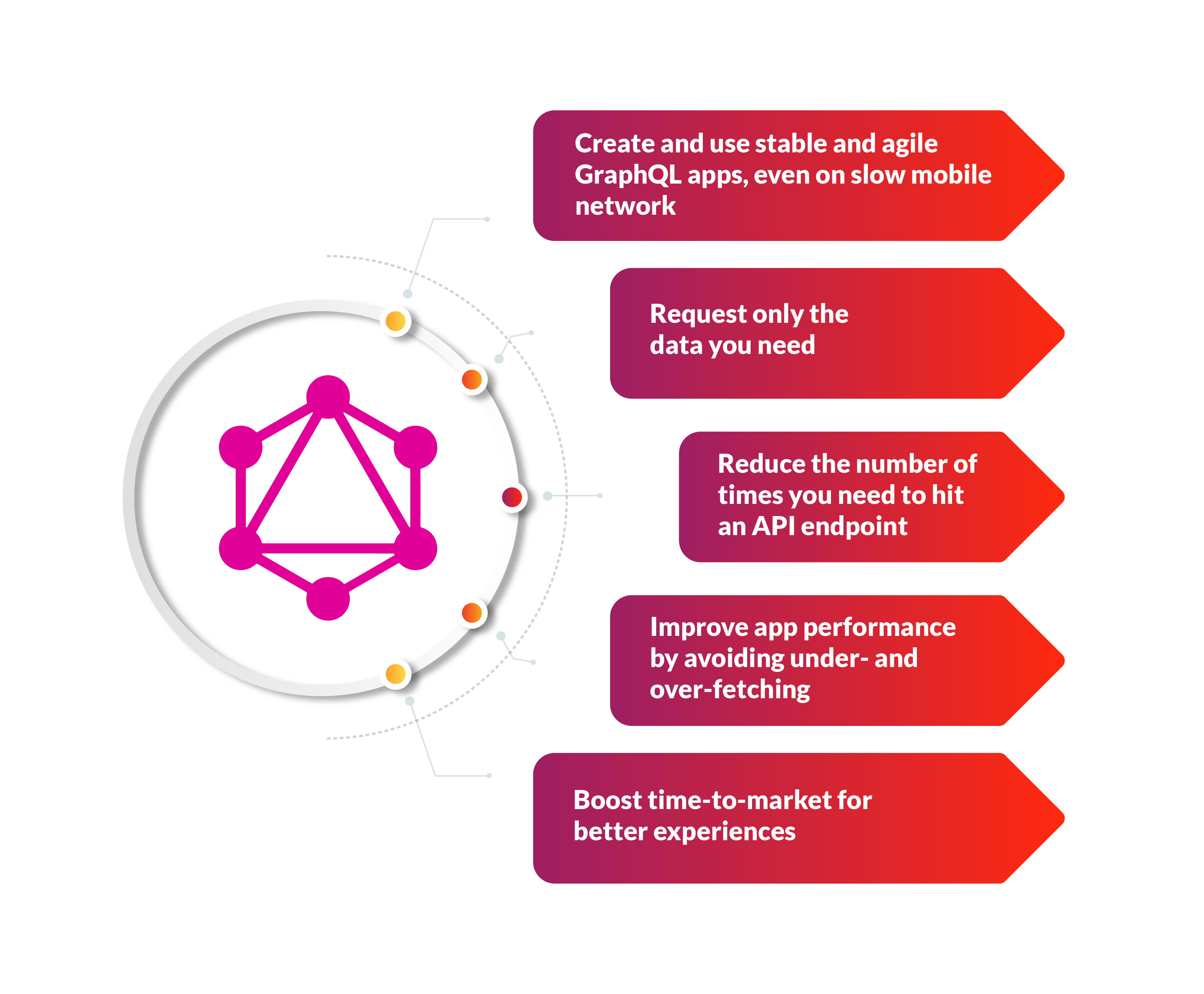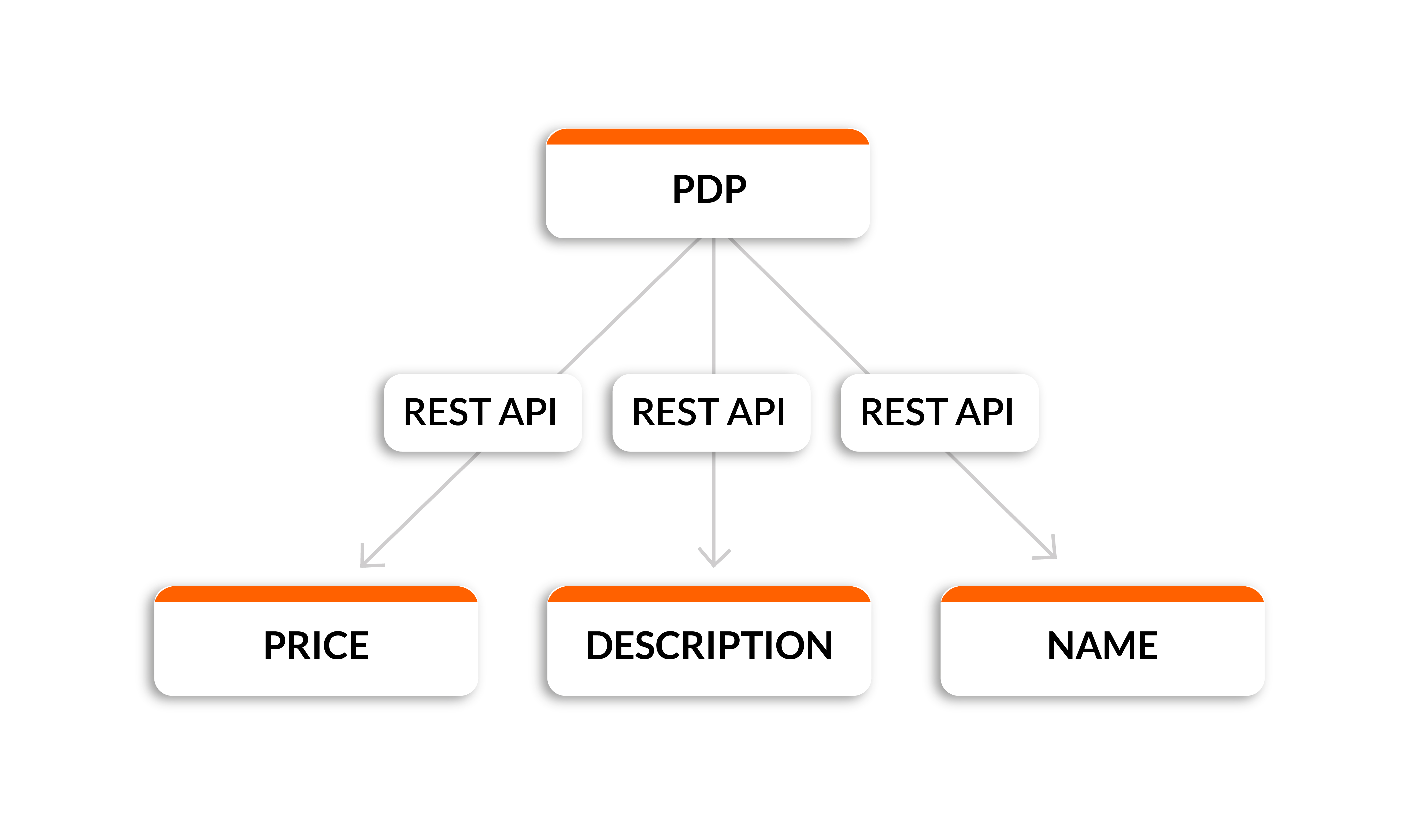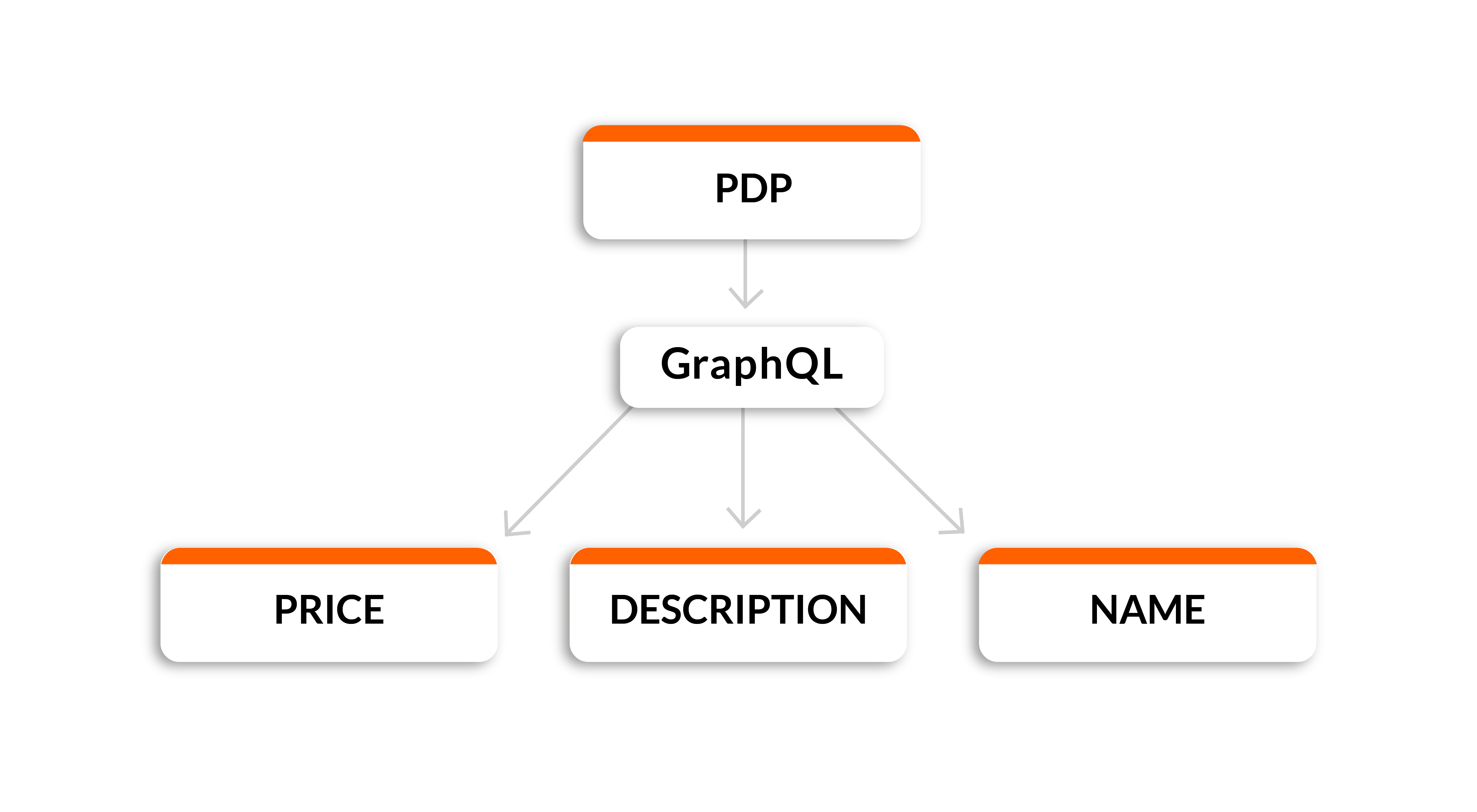GraphQL is a query language for APIs that indicates to the API how to show the requested data to the client on the backend. It was created as a new alternative to the REST-based architecture and addresses the issues such as the need for more effective data loading, fulfilling demands on swift feature development, and creating APIs that satisfy every client’s needs. GraphQL API is a perfect tool for integrating your e-commerce smoothly with your system.
What will GraphQL do for your e-commerce business?
With the help of GraphQL, you get great marketing support for your projects, get better performance for your customers, which often results in increased interactions, a better employee experience, more efficiency in your business, a boost in intellectual and financial contribution to infrastructure development, and more! Sounds good? Let’s learn about it further!
GraphQL advantages for e-commerce solutions

Let’s sum all of the GraphQL advantages in a list on your right. What can you do with GraphQL?
GraphQL is the key to the bright future of APIs in e-commerce development. Apollo (a widespread GraphQL implementation about which you can read later in the article) raised $22 million in growth funding. This proves that VC’s acknowledged a business opportunity in GraphQL technology too, and this makes a confident statement about GraphQL as the future of APIs.
GraphQL vs REST
GraphQL is organized in terms of schema and type system and is client-driven while REST is server-driven and systematized in endpoints. With GraphQL you can fetch specific data with just one API call, if you use the REST, you will need to make a multiple API call.
Let’s look at the example. Let’s say you own an online shop. When a customer goes through a product display page (PDP), the front-end makes a request to the REST API for the pricing data, which will come back with the information about the latest sale price and will be displayed on the PDP. If you want price, product name, and description displayed all at the same time, you will need to make multiple REST APIs requests. Making multiple API calls simultaneously may affect performance in a negative way.

What if you switch to GraphQL instead? Then all you need to do is make only one request for “product information” and the GraphQL layer will collect all required information and send it back to the front-end in a single document. And because of that, there will be no negative effect on the performance. It’s so much easier this way, isn’t it?

Languages that GraphQL supports
GraphQL has widespread and effective language support. JavaScript, Python, Go, PHP, Java/Kotlin, C#/.NET, Ruby, Elixir, Rust, Swift/Objective-C, Scala, Flutter, Clojure, C/C++, Haskell, Elm, OCaml/Reason, Erlang, Groovy, R, Julia, Perl, and D - these are the supported languages. Let’s find out more about such supported languages like Python and JavaScript.
GraphQL Python
Python language presents 3 GraphQL Python clients (GQL, sgqlc, python-graphql-client) and 4 libraries for working with GraphQL:
- Graphene - builds GraphQL APIs
- Ariadne - invokes GraphQL servers applying a schema-first approach
- Tartiflette - builds GraphQL APIs
- Strawberry - implements code first GraphQL servers with type hints and other modern Python features
GraphQL JS (React, VueJS, etc)
Javascript offers 11 GraphQL JS clients (GraphQL request, Apollo Client, AWS Amplify, Relay, urql, graphqurl, Lokka, graphql-hooks, nanogql, Grafoo, gq-loader) and 5 libraries:
- GraphQL.js - the reference implementation of GraphQL for Node.js environment
- Apollo Server - GraphQL server packages for Node.js and HTTP frameworks
- Express GraphQL - the reference implementation of GraphQL server over an Express server
- GraphQL Helix - utility functions to build a GraphQL HTTP server
- graphql-yoga - a fully-featured GraphQL server
GraphQL in Saleor for Python and Django-based e-commerce marketplaces
Saleor is considered the fastest-growing GraphQL e-commerce platform in the world. It has got great support and maintenance from GraphQL, Python, and Django communities. GraphQL made Saleor a perfect open-source solution for building adaptable and scalable e-commerce business solutions that fit one’s every need. Saleor allows you to serve thousands of customers with millions of products and services as smoothly as ever. Cloud and multi-container deployments, high scalability, observability, and performance metrics - Saleor gives you all of that. Moreover, it is easily customizable for you to automate any specific processes to your requirements. So, Saleor is a perfect solution for you, if you aim at building a robust bespoke e-commerce solution. Click here to have our experts analyze how suitable Saleor will be for your business.
GraphQL tools and libraries
GraphQL gives you access to its extensive libraries and functional tools. Here we gathered the most popular and widely used ones. Some of them were already mentioned in the article, and now you’ve got a chance to explore them more. What are they and how can they be used in your business? Let’s find out!
Apollo Client and Server
The Apollo JS platform helps with transferring data from the cloud (server) to your UI. Apollo enables handling GraphQL on the client and server side of the app. Apollo Client is a library for JavaScript that allows handling remote and local data with GraphQL and is used for fetching, caching, and modifying application data with updating your UI automatically. Apollo Server is a spec-compliant open-source GraphQL server that can be queried from any GraphQL client and is used for building self-documenting and ready for production GraphQL API that is capable of managing data from any source. Different frameworks have their own Apollo applications, for example, VueJS has got Vue Apollo, where Apollo is integrated into Vue components with declarative queries.
Bit
Bit is an open-source tool and platform that is used to build and reuse components. Bit helps with turning your API examples and client into shareable components instantaneously. It also enables you to make adjustments to the component’s code straight from the consuming repo.
Relay
Relay is a JavaScript framework that is like a bridge between GraphQL and React for leveraging the component-based encapsulated nature of React. Relay allows data mutation on server and client sides using GraphQL mutations and provides you with error handling, automatic data consistency, and optimistic updates.
Prisma
Prisma is a server-side library that simplifies database workflows and replaces traditional ORMs. With Prisma, app developers can build quicker and make fewer errors. It is easier to implement strong, production-ready GraphQL servers including pre-designed CRUD operations with the help of Prisma.
GraphQL Editor
GraphQL Editor is a visual Node editor that simplifies the understanding of GraphQL schemas. It helps you to prototype the system’s architecture faster and simpler as you can work with visual blocks that are then transformed into code by GraphQL Editor.
GraphiQL
GraphiQL is an integrated development environment (IDE) that helps with structuring GraphQL queries properly. GraphiQL has got real-time error showing and reporting, Syntax highlighting, query autocompletion, intelligent type ahead of fields, documentation explorer, arguments and types, and tools for running and inspecting query results.
Altair
Altair is a GraphQL client that makes GraphQL queries to a GraphQL server. It’s a nice tool with which you can add, alter, and delete HTTP headers used in forming a request, along with authentication token headers for requests that demand authorization.
GraphQL Playground
GraphQL Playground is a GraphQL IDE that helps with managing subscriptions, documents, and collaboration. This IDE comes with interactive multi-column docs, Config support with various Projects & Endpoints, context-aware automated completion, showing errors, and Apollo Tracing support.
URQL
URQL is a React client that is known for its versatility and superb customization. URQL was created to help avoid the bigger footprint of most clients and develop a library, lightweight but complex enough for scaling. This creates a balance between complexity and simplicity that makes data storage more advantageous than ever.
GraphQL Voyager
GraphQL Voyager is an open-source tool that shows GraphQL APIs in interactive visual graphs. It helps with faster navigation, has got a panel with specific information about each type of your graph, the ability to select any type to become a graph root, and a “skip Relay” alternative that makes the graph easier to understand by deleting Relay wrapper classes.
Express GraphQL
Express GraphQL is a library that helps with making an Express server that runs a GraphQL API. It works with Сonnect and Restify as well.
But that’s not all of it! There are more good GraphQL tools and libraries out there that we couldn’t place in one article. Make sure to check them out!
GraphQL in e-commerce development
These and many other convenient GraphQL libraries and frameworks can be implemented in e-commerce development that will make your business even more successful and easier to manage. GraphQL is undoubtedly a highly technical solution, but it brings benefits that are not limited only to your technical team, it brings a positive effect to the whole e-commerce business. If great maintainability and productive performance are what you are looking for, then GraphQL is worth trying. Our team can help you choose what’s best here for your business, also quickly and successfully install everything you need. Talk to us and we will fulfill all your requirements!
